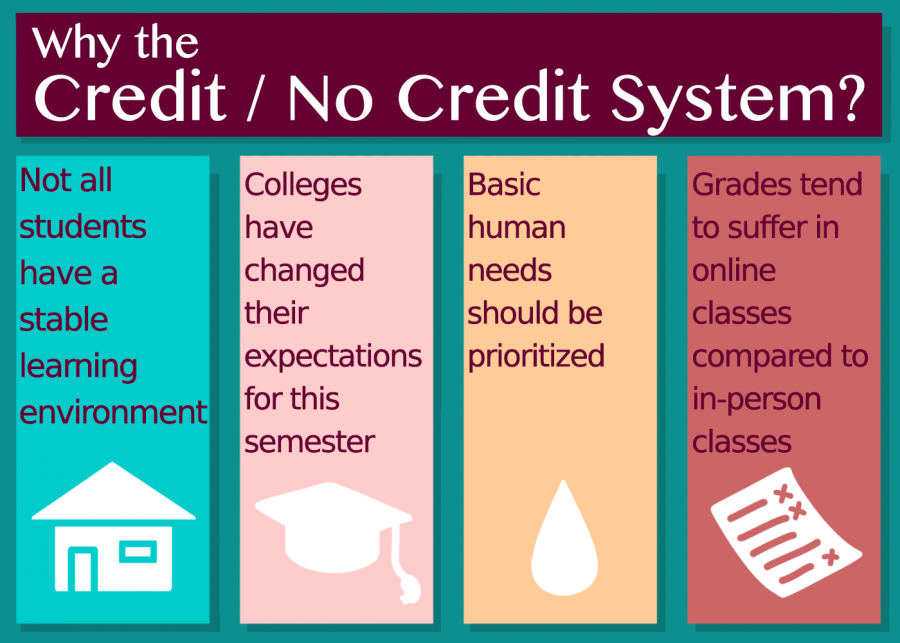Teachers Michelle Bissonnette and David Campbell guest write in support of the credit/no-credit grading policy for the spring 2020 semester.
Credit/no credit grading: It’s about reality, not charity (Op-Ed)
April 14, 2020
As President, and former President, of the District Teachers Association (DTA) for MVLA, and as teachers with collectively three decades of experiences in our district, we feel compelled to address some of the issues in Guest opinion: Let’s not allow COVID-19 to harm any student’s grades, written by MVLA School Board member Phil Faillace.
We, along with other colleagues, spoke at the Monday, April 6 MVLA School Board meeting in support of MVLA Superintendent Nellie Meyers’s recommendation to move to a credit/no credit grading system for the final semester of the 2019-2020 school year. We are grateful that the MVLAUHSD Board of Trustees has exhibited sound judgment and regard for educational experts in the district and broader education community by voting in favor of credit/no credit grading.
This is the best approach to address the unstable environment for teaching during a global pandemic. Teachers across the country are being asked the impossible, and we will rise to the occasion, as we always do.
Learning during COVID-19 highlights the inequities that already exist when we’re learning inside four walls. The power of equity that a physical classroom provides is impossible to replicate through distance learning. In effect, assigning letter grades to our students is equal to assessing their access to technology and WiFi, their housing security and ableism. This is why so many districts have moved to this model, including neighboring districts in Santa Clara and Palo Alto. In recent days, the University of California system, Yale, Harvard, MIT, Dartmouth, Stanford and many other colleges have made the shift too, opting to focus on students’ learning experiences over grades.
It is also why this semester will stand as an anomaly to most colleges and universities when assessing student achievement. Colleges and universities will forever have an asterisk by the spring semester of this school year. They will question the validity and rigor of learning experiences, as well as the reliability of grades and what they represent.
We simply aren’t willing to take that chance with students’ futures.
Below, we outline research that shows moving to a credit/no credit system will offer the greatest benefit to students.
Basic needs such as food, water, warmth and security must be met first.
For many students, including high-achieving students throughout our community, this pandemic is jeopardizing even the most basic of human needs. Family stability is being tested in ways that transcend socioeconomics and access to resources. Abraham Maslow’s “Hierarchy of Needs” illustrates that the most basic physiological and safety needs such as food, water, warmth and security must be met before higher-level needs such as esteem and self-actualization can be satisfied. In other words, you need a belly full of food and to know that you’re safe to achieve your full potential. Continuing to grade students by traditional measures will not only widen the achievement gap between students in this district, but it can also disadvantage high-achieving students who are trying to report and maintain letter grades as well.
Online learning reduces student success and lowers a student’s GPA.
EdTrust Vice President of Higher Education Policy and Practice Wil Del Pilar, in his piece titled “Thoughts from a Former College Admissions Officer in the COVID-19 Era,” points to an article of online learning as colleges try to provide access to more students. The study answers the question, “As schools [close or] move to an online platform, how will students’ grades be impacted? Some research has shown that online learning reduces student success and lowers a student’s GPA. Given this, institutions should carefully consider students’ GPAs prior to and after, if online learning was implemented, the disruption of their learning.”
According to a different study, “Virtual Classrooms: How Online College Courses Affect Student Success,” it appears that “taking a course online, instead of in-person, reduces student success… The estimated effect is a 0.44 grade point drop in a course grade, which amounts to one third of a standard deviation decline.”
The same study says “the negative effect of online course-taking occurs across the distribution of course grades; taking a course online reduces the probability of earning an A or higher by 12.2 percentage points, a B or higher by 13.5 points, a C or higher by 10.1 points, and a D or higher (passing the course) by 8.5 points (results presented in online Appendix Table 4, page 15).
A credit/no credit system alleviates the potential negative consequences for all students who have dreams of attending college. This shift reduces the overwhelming pressure that learning in this environment causes. Staff can administer assessments without having to overly focus on maintaining the integrity of the fine delineations of letter grades. Students can focus on what is needed most at this moment: maintaining their well-being and learning.
We appreciate the opportunity to share our thoughts on this critical issue facing our community.
Note: Michelle Bissonnette is an English and Global Connections teacher at Los Altos. David Campbell is a Spanish teacher at Mountain View High School.


